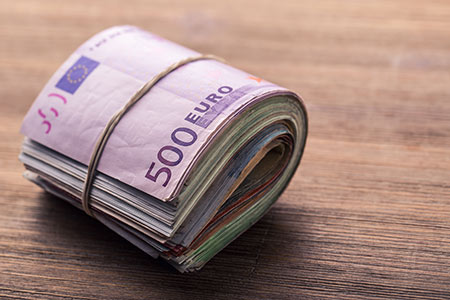
In fiscal year 2023/2024 (September 30), thyssenkrupp performed well in a persistently very challenging market environment and continued on its transformation course. En route to improving its performance, the group was able to cushion a large part of the negative market effects thanks to its APEX performance program and is now systematically expanding the program. The aim is to support the return to a sustainably positive free cash flow before M&A and a positive value added in the long term.
“Despite the very challenging market conditions, we achieved a respectable result in the past fiscal year, continued implementing the transformation of the thyssenkrupp group with great determination and made key progress,” summarises Miguel López, CEO of thyssenkrupp AG.
Fiscal year 2023/2024: Key indicators for the thyssenkrupp group
Significantly weaker demand from key customer industries like the automotive industry, engineering and construction had a negative impact on the group’s key financial indicators in the past fiscal year. This was primarily evident from the declining order intake, which amounted to €32.8 billion in fiscal year 2023/2024 (prior year: €37.1 billion). Whereas Marine Systems significantly increased order intake thanks to substantial extensions of two existing orders in the submarine business and higher order intake in the marine electronics business, Steel Europe, Materials Services and Automotive Technology recorded declines. Decarbon Technologies also posted a significant decline following the high demand in the chemical plant engineering business in the prior year.
Sales of the thyssenkrupp group also declined against the backdrop of subdued market momentum, amounting to €35.0 billion (prior year: €37.5 billion). This was mainly attributable to weaker demand and lower prices at Materials Services and Steel Europe. Automotive Technology also saw a downward trend in the construction machinery business, in automotive assembly lines and in parts of the automotive original equipment business. By contrast, thanks to the high order intake in the prior period, ongoing major projects at Uhde and the growth of water electrolysis, Decarbon Technologies significantly increased sales year-on-year. At Marine Systems too, sales increased due to reasons such as the delivery of a submarine and progress in new construction projects.
Adjusted EBIT amounted to €567 million (prior year: €703 million). Whereas Materials Services and Marine Systems improved their contributions to earnings year-on-year, the difficult market situation had a noticeable impact at Steel Europe and Automotive Technology especially. Compared with the prior year, Decarbon Technologies also saw reduced earnings, due to factors including higher costs for individual (legacy) projects in the cement engineering business. Positive effects from the APEX performance program supported earnings in all segments and cushioned a large part of the negative market effects. thyssenkrupp thus achieved its earnings forecast of more than €500 million, last adjusted in July 2024 in light of the persistently weak macroeconomic environment.
At €110 million, free cash flow before M&A was positive and above the latterly forecast amount, also due to early payments by Marine Systems customers in the 4th quarter.
“We achieved our target for adjusted earnings and actually exceeded the target for free cash flow before M&A, again ending the year positively,” emphasises Jens Schulte, CFO of thyssenkrupp AG. “In order to create the necessary financial headroom for the continuing transformation, we will be using APEX 2.0 to now focus more on structural issues as well. In this way, we will establish the conditions for continuing to make progress, even in a difficult market situation.”
Overall, thyssenkrupp posted a net loss of €1.4 billion in the past fiscal year (prior year: net loss of €2.0 billion). The negative figure reflects the extensive transformation measures and is mainly attributable to asset impairments totaling some €1.2 billion. Most of these had to be recognised by Steel Europe (around €1 billion), Materials Services and Automotive Technology. Alongside increasingly gloomy volume and earnings expectations, factors included the structural changes in the steel industry, the anticipated future investments for the green transformation and the economic effects expected from the ongoing construction of the direct reduction plant. Other expenses of around €270 million resulted from the necessary restructuring measures in Automotive Technology, Decarbon Technologies and Materials Services especially. Net income after deducting minority interest was €(1.5) billion (prior year: €(2.1) billion); earnings per share came to €(2.42) (prior year: €(3.33)).
Compared with a year earlier, equity decreased from €12.7 billion to €10.4 billion. Alongside the net loss, this development was caused by effects from the remeasurement of pensions due to the application of lower discount rates and by currency translation effects. The equity ratio remained at a comfortable value of 35% (prior year: 39%).
Thanks to the positive free cash flow before M&A, net financial assets on the reporting date increased to €4.4 billion (prior year: €4.3 billion). With cash and cash equivalents and undrawn committed credit lines totaling €7.1 billion on the reporting date, thyssenkrupp retained a very good liquidity position.
It will be proposed to the Annual General Meeting on January 31, 2025 that a dividend of €0.15 per share be paid for fiscal year 2023/2024. In this way, thyssenkrupp is ensuring dividend continuity following the distribution in the past two years.
Click here for free registration to World Cement
Read the article online at: https://www.worldcement.com/europe-cis/19112024/thyssenkrupp-reports-positive-cash-flow-and-strategic-progress-amid-market-challenges/
Embed article link: (copy the HTML code below):
